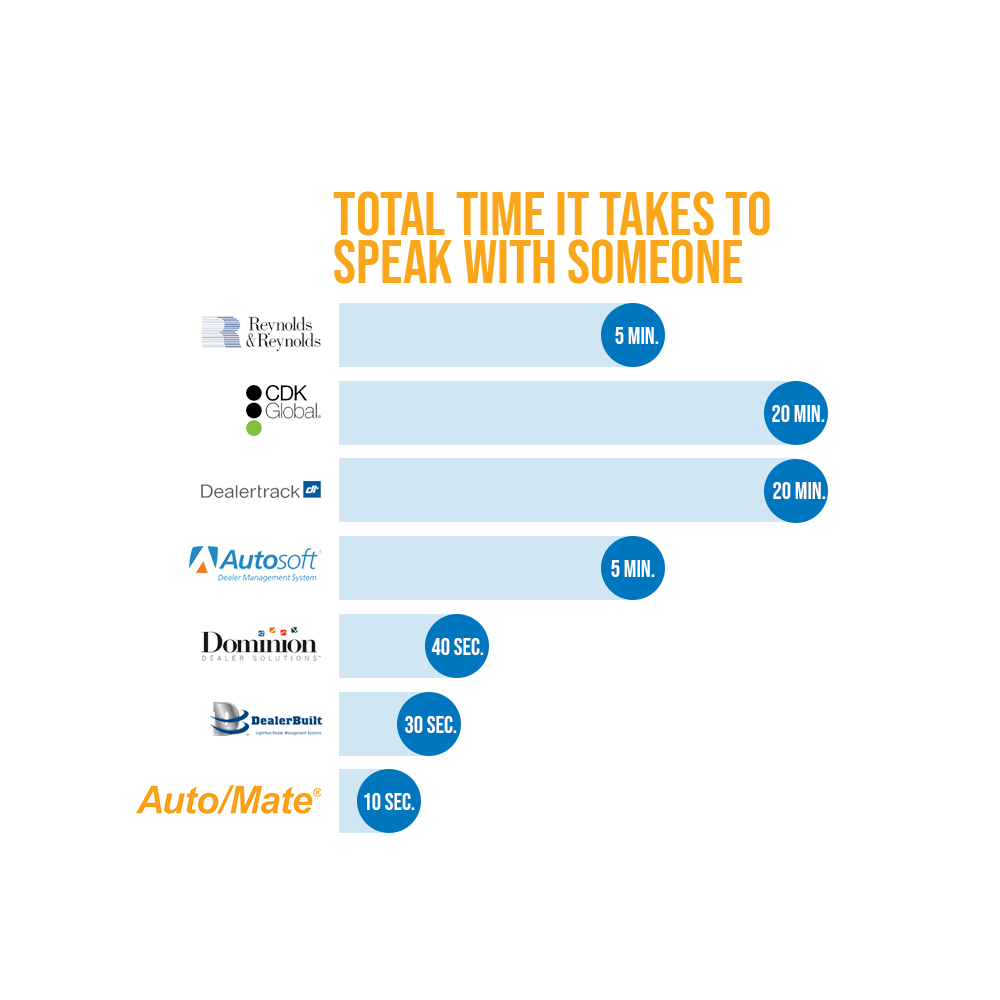© 2023 Auto/Mate, Inc. All Rights Reserved.
6 Red Flags Signaling It’s Time for a New DMSThere are two types of people in the dealership: those who are frustrated with their DMS and don’t know why and those who do know why but don’t do anything about it. But what both might not realize is that the issues they’re facing are costing the dealership money, time and, quite honestly, their own sanity. This white paper will examine six triggers that make dealerships decide it’s finally time for a new DMS.What’s the Problem?Approximately, half of all dealers would consider switching their current DMS. But not all of them take this giant step. Why? There’s a sense of fear and concern about switching. Though they recognize their interest and even their need, they’re not always spurred to take the next step. However, when faced with the critical business issues challenging productivity and profits, examining viable alternatives and overcoming this fear of change become paramount. Common frustrations that have triggered dealers to examine new alternatives include: |
RECOMMENDED READING |
In addition to these issues, this white paper will explore several other pain points that make dealers consider switching their DMS providers.1. Training is a HassleWith a staggering overall turnover rate of 67 percent in dealerships and an average employee tenure of just two and a
|
 |
 |
To combat overwhelming monthly integration fees, some DMS vendors have taken an approach to open standards with application programming interfaces. These APIs are designed to limit integration costs by allowing dealerships to connect with vendors of their choice through secure, real-time data exchanges.4. Your Team Is Spending Too Much Time Performing Manual ProcessesA DMS’ weak third-party integrations usually means more manual data entry for your dealership. Aside from the needless task of typing data into the system a second time, dealerships run into the issue of fat fingering incorrect information or pulling in the wrong numbers from one screen to another. Your team shouldn’t have to spend time fixing errors when they have customers waiting to be helped. This is a problem the software industry solved many years ago.A good DMS should take any dealership’s workflow into consideration when developing or enhancing features in the software. It’s not practical to have multiple tabs open in the DMS, or have to leave the DMS and jump into another program just to value a trade, process credit or check for any open recalls. DMS vendors that offer fluid and more streamlined workflows help eliminate manual data entry into the DMS and reduce the risk of incorrect data. |
Considering the cost of downtime, it’s crucial your DMS gives you immediate access to and control of your network.6. You Don’t Really Know What You’re Paying ForIt might sound like common sense, but when was the last time you really took a good hard look at your monthly DMS bill? You might discover software add-ons you’ve purchased but aren’t using. You might find charges for additional services like customizing a report, document storage fees and software upgrades. Maybe you’ll find costs for consumables like toner, paper or other items. You’ll likely see hardware charges for items that are much less expensive on the open market. In the end, you’ll likely recognize a gap in the cost to value equation.So the next time you get your monthly DMS bill, take a long look at it and ask yourself whether or not your provider is earning money by giving you value or gouging you for needless line items that just aren’t worth it.ConclusionThese red flags are more than just a warning. If ignored for too long, they’ll take a toll on your efficiency, profits and customer experience. If you’ve found that you relate to a number of these critical business issues, it may be time to explore what the root of the problem is. Is it a people, process or software issue? What you discover will determine what steps you need to take next.Find out how Auto/Mate can help you solve these red flags in your dealership. Contact us today to set up a consultation discussion about the specific challenges your dealership faces. |